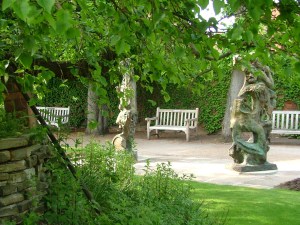Okay folks,
People keep asking so I figure I should say something before I say something. On October 28th, this is going to be unleashed unto the world:
[youtube http://www.youtube.com/watch?v=S5XcyiQ50W8]
Yesterday’s New York Times featured an op-ed review of the film written by Professor James Shapiro of Columbia University (prominent Shakespearean and author of a great many books ).
Let’s take a moment to talk about the authorship debate. The nineteenth century saw the deification of Shakespeare (debatably) at its peak. It was during this time that scholars and literati realized that very little biographical information was available about our esteemed playwright. Because of this dearth of fact, said literati began to suspect the actuality of William Shakespeare as author of the plays (backed by an insistence that Shakespeare only had a base-level of education and the plays were so transcendent that they must have been written by a University man). Thus the so-called “anti-Stratfordians” were born. In an effort to validate this conclusion, various figures have been put forth as alternative “authors” to the plays (including Francis Bacon, Christopher Marlow, and Edward De Vere the 17th Earl of Oxford).
All of these arguments have fundamental flaws (perhaps the most amusing being the fact that De Vere died in 1604, years before at least ten of Shakespeare’s plays were written). I don’t really have the space to get into the full implications of each argument here, but I’ll be happy to divulge what I know if you buy me enough alcohol (or shoot me an e-mail and ask).
In any case, “Anonymous” falls into what is referred to as the “Oxfordian” camp (i.e. it argues that De Vere wrote the plays).
Here’s my brief opinion of the authorship debate: why are we wasting our time? No matter how we slice it, Shakespeare (either the man from Stratford or the great playwright – whether these two are the same person or not) is dead. Shakespeare the man from Stratford existed. Shakespeare the playwright wrote amazing, transcendent works of literature which continue to touch upon the human soul hundreds of years after his death. Everything else is a fairy tale. Whomever this person was, no matter what his life was like,

sitting under the Mulberry tree in Shakespeare's garden in Stratford... my happy place
the important thing is that the plays do exist and they do continue to effect us. Whether he planted the mulberry tree behind his property in Stratford, whether he hated his wife and ran away with the traveling players to get away from her, whether he was homosexual or heterosexual or bisexual, “he” undoubtedly left us something. Shakespeare is more important to the modern world as a concept than a person. We scholars can tell ourselves pretty stories about his life all we want, and back them with as many or as few facts as we can find, but the bottom line is that barring some unforeseen and incredible discovery of a cache of lost documents, we will never be able to prove definitively even a majority of what we tell ourselves. So we may as well concede that fairy tales are nice, but the play is the thing.
Now, allow me to briefly address Shapiro’s piece. I sympathize with Dr. Shapiro. I am fully expecting to leave the theatres angry and frustrated that the good name of my man Will has been despoiled. Will this keep me from seeing a movie about Will? Absolutely not.
However. Dr. Shapiro’s argument in this op-ed piece is perhaps born a bit too much out of the described heat of passion which I am certain will also haze my own vision in red. Shapiro states that he is more troubled by the fact that “Anonymous” “turns great plays into propaganda” and takes great exception to the film’s point of view that “all art is political… otherwise it is just decoration”.
…well… isn’t that actually true? I mean, there’s the famous anecdote about Elizabeth I barring any performance of Richard II by saying “know you not that I am Richard?” after

to me, Elizabeth I will always be Judi Dench
the Essex rebellion, but Elizabethan politics are written more subtly all over Shakespeare’s plays. And not just the histories! Love’s Labours Lost begins with the cession of Aquitaine to Naverre. A Midsummer Night’s Dream is founded upon the principle that Theseus defeated Hippolyta’s tribe of amazons. As You Like it begins and ends in an upturned world of unjust political tyranny made right at the end by the return of the proper Duke. The Tempest depicts a wild world of chaos organized only by true noble blood which must be forfeit to return to the courtly world of Milan.
Art is power. And especially in Elizabethan times when plays were the most popular form of public entertainment. Shakespeare was never shy about expressing his opinions via the theatre, and we shouldn’t be shy about saying that’s what he (whomever he was) was doing. The canon is not just dead words, it’s imbued with a certain living history and understanding of audiences (both past and future). And really, that’s part of why it’s still relevant.
In addition, Dr. Shapiro’s title makes me anxious. It’s not Hollywood that’s dishonoring the Bard, it’s every anti-Stratfordian whose research led to this movie. Yes, the film itself comes from the institution of Hollywood, but it sprang from us. Without the scholars, the movie wouldn’t have come to be. Blaming the product upon the process is like blaming the bomb and not the scientists who developed it or the politicians who set it off. We can’t claim diplomatic immunity here, we’re part of the problem.
It is with great respect for Dr. Shapiro that I am forced to disagree with his conclusion. His rage, however, is one which I’m certain I’ll be sharing of in the next few weeks.

